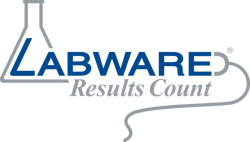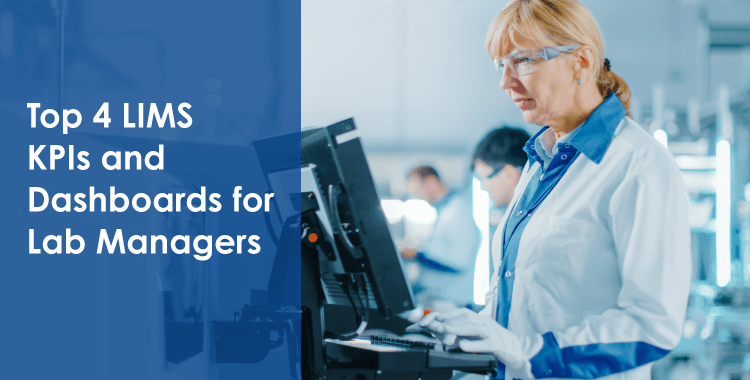
Effective utilization of LIMS KPI Dashboards is crucial for driving laboratory efficiency and streamlining processes. In this blog post, we will delve into the importance of key performance indicators (KPIs) in a lab setting, focusing on how they enhance accountability and can be customized to cater to specific requirements.
We will also provide an overview of LabWare Dashboards, discussing their role in simplifying data collection and processing while offering tailored features based on user needs. Furthermore, we will explore the benefits of Lot Management Dashboard in efficiently tracking product lots and reducing risks through improved control measures.
Last but not least, our discussion on Stability Management Dashboard will highlight its significance in effectively monitoring active stability studies and guiding data-driven decisions for optimal results. By understanding these aspects of LIMS KPI Dashboards, you'll gain valuable insights that can help elevate your laboratory's overall performance.
Importance of Laboratory KPIs
Key Performance Indicators (KPIs) are invaluable tools that measure a company's effectiveness, helping laboratories stay accountable toward their set standards. Customized to each laboratory, these metrics ensure the achievement of lab goals and improve overall efficiency. In this section, we will discuss how KPIs enhance accountability in labs and can be customized for specific lab requirements.
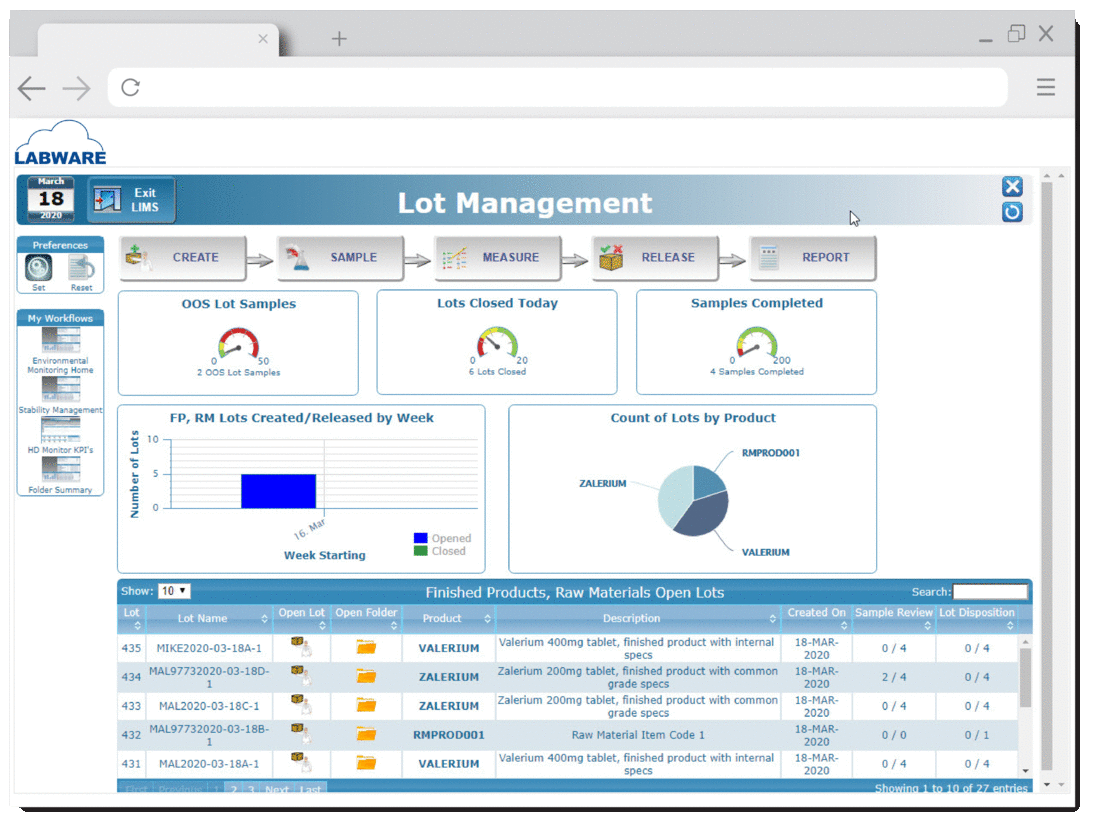
Enhancing Accountability in Labs
Within the current laboratory climate, it is essential to sustain top-notch performance and excellence. Implementing KPIs allows organizations to monitor progress towards achieving strategic objectives by setting measurable targets against which actual performance can be compared. This ensures that resources are allocated effectively and provides a clear picture of areas where improvements may be needed.
- Data-driven decision-making: By measuring key aspects such as turnaround time, error rates, or customer satisfaction levels, managers can make informed decisions based on real-time data rather than relying solely on intuition or anecdotal evidence.
- Benchmarking: Comparing your laboratory's performance with industry best practices or competitors helps identify gaps in processes and drives continuous improvement efforts.
- Motivating staff: Setting challenging but achievable targets encourages employees to strive for excellence while providing them with tangible feedback on their contribution towards organizational success.
KPI tracking also promotes transparency within the organization as stakeholders have access to accurate information about the current state of affairs. This fosters trust among team members and creates an environment conducive to collaboration and innovation.
Customizing KPIs for Specific Lab Requirements
Each laboratory is unique, with different goals, processes, and challenges. Consequently, it is critical to pick KPIs that are pertinent to your lab's individual circumstances. This ensures that the metrics you track align with your strategic objectives and provide actionable insights.
To develop a set of customized KPIs for your laboratory:
- Identify key objectives: Start by outlining the primary goals of your organization or department - these could include improving efficiency, reducing costs, or enhancing customer satisfaction levels.
- Select appropriate indicators: Choose performance measures that directly relate to each objective and can be quantified in some way. For example, if one goal is to reduce turnaround time on test results, an appropriate KPI might be the average time taken from sample receipt to report generation.
- Determine targets: Establish realistic but challenging targets based on historical data or industry benchmarks. These should be regularly reviewed and adjusted as needed.
- Maintain accurate records: Ensure all staff members understand their role in tracking performance data accurately so that management has access to reliable information when making decisions about resource allocation or process improvements.
In addition to selecting suitable KPIs tailored for your lab's needs, Lab Manager Magazine suggests involving employees in this process as they have valuable insights into daily operations which may not be apparent at higher levels within the organization. By engaging team members in developing meaningful performance measures aligned with company values and priorities, laboratories can foster a culture of continuous improvement where everyone feels empowered to contribute towards achieving shared goals.
Implementing KPIs in your laboratory is an essential step towards enhancing accountability and driving performance improvements. By selecting relevant metrics tailored to your lab's unique requirements, you can ensure that resources are allocated effectively and foster a culture of continuous improvement across the organization. LabWare, a leading Laboratory Information Management System (LIMS) provider, offers powerful tools such as customizable dashboards that enable efficient access to data, meaningful analysis, and high visibility across various aspects of laboratory management - ensuring your team stays on track with its strategic objectives.
The importance of Laboratory KPIs cannot be overstated as they provide an effective way to measure lab performance and enhance accountability. By leveraging LabWare Dashboards, labs can streamline data collection and processing while customizing features according to user needs.
Key Takeaway: Implementing Key Performance Indicators (KPIs) in laboratories is crucial for enhancing accountability, promoting transparency, and driving performance improvements. Customizing KPIs to specific lab requirements by identifying key objectives, selecting appropriate indicators, determining targets and maintaining accurate records ensures resources are allocated effectively while fostering a culture of continuous improvement across the organization. LabWare's customizable dashboards offer powerful tools for efficient access to data analysis and high visibility across various aspects of laboratory management.
LabWare Dashboards Overview
LabWare dashboards provide an efficient way to obtain and process important information while keeping lab managers well-informed on all operations. These customizable dashboards allow easy access to data, meaningful analysis, and high visibility across various aspects of laboratory management. In this section, we will discuss how LabWare dashboards streamline data collection and processing as well as how they can be tailored according to user needs.
Streamlining Data Collection and Processing
To ensure informed decisions are made quickly, LabWare's Laboratory Information Management System (LIMS) provides a range of dashboards with key performance indicators (KPIs) to aid users in visualizing data sets. LabWare's Laboratory Information Management System (LIMS) offers a range of key performance indicators (KPI) dashboards that help users visualize complex data sets with ease. By providing real-time insights into critical metrics such as sample turnaround time, resource utilization, instrument performance, and more - these interactive tools enable labs to optimize their processes effectively.
- Data visualization: LabWare KPI dashboards present your laboratory's crucial information through visually appealing charts and graphs that are easy-to-understand at a glance.
- User-friendly interface: The intuitive design allows even non-technical users to navigate through the dashboard effortlessly without any prior training or experience required.
- Faster decision-making: With instant access to relevant metrics at their fingertips, lab managers can quickly identify areas requiring improvement or further investigation - ultimately leading them towards better outcomes for both clients and stakeholders alike.
Tailoring Dashboard Features According To User Needs
No two labs are identical, and each one necessitates different data analysis needs. LabWare dashboards offer a high degree of customization, enabling users to create personalized views that cater specifically to their individual needs. This flexibility ensures that the right information is always readily available for making well-informed decisions.
- Custom KPIs: Users can define their own key performance indicators based on specific criteria relevant to their laboratory operations, ensuring the most pertinent metrics are tracked and analyzed.
- Configurable layouts: The layout of each dashboard can be easily adjusted by adding or removing widgets as needed, allowing users to focus on what matters most in their particular context.
- Data filtering and sorting: Dashboards provide advanced filtering options so that only the most relevant data is displayed, while also offering various sorting capabilities for better organization and understanding of results.
In addition to these customization features, LabWare's LIMS platform offers several pre-built dashboard templates designed specifically for different types of laboratories - such as clinical diagnostics labs or pharmaceutical manufacturing facilities. These templates serve as an excellent starting point for new users who may not yet have a clear idea about which KPIs they should track or how best to visualize them within a dashboard environment. Once familiar with the system, users can then modify these templates further according to their own requirements and preferences to suit their specific needs perfectly.
By streamlining data collection and processing while offering extensive customization options for each user's needs - LabWare dashboards empower lab managers with actionable insights derived from real-time data. This invaluable information enables them to optimize their laboratory's performance, ensuring the highest possible levels of efficiency and effectiveness in all aspects of operations.
LabWare Dashboards Overview provides an efficient and reliable way to streamline data collection and processing, tailored according to user needs. By leveraging Lot Management Dashboard, businesses can reduce risks through improved control measures while efficiently tracking product lots.
Key Takeaway: LabWare dashboards offer a customizable and user-friendly way to streamline data collection and processing, providing lab managers with real-time insights into critical metrics. With features such as data visualization, custom KPIs, configurable layouts, and advanced filtering options - LabWare dashboards empower users to make well-informed decisions that optimize laboratory performance.
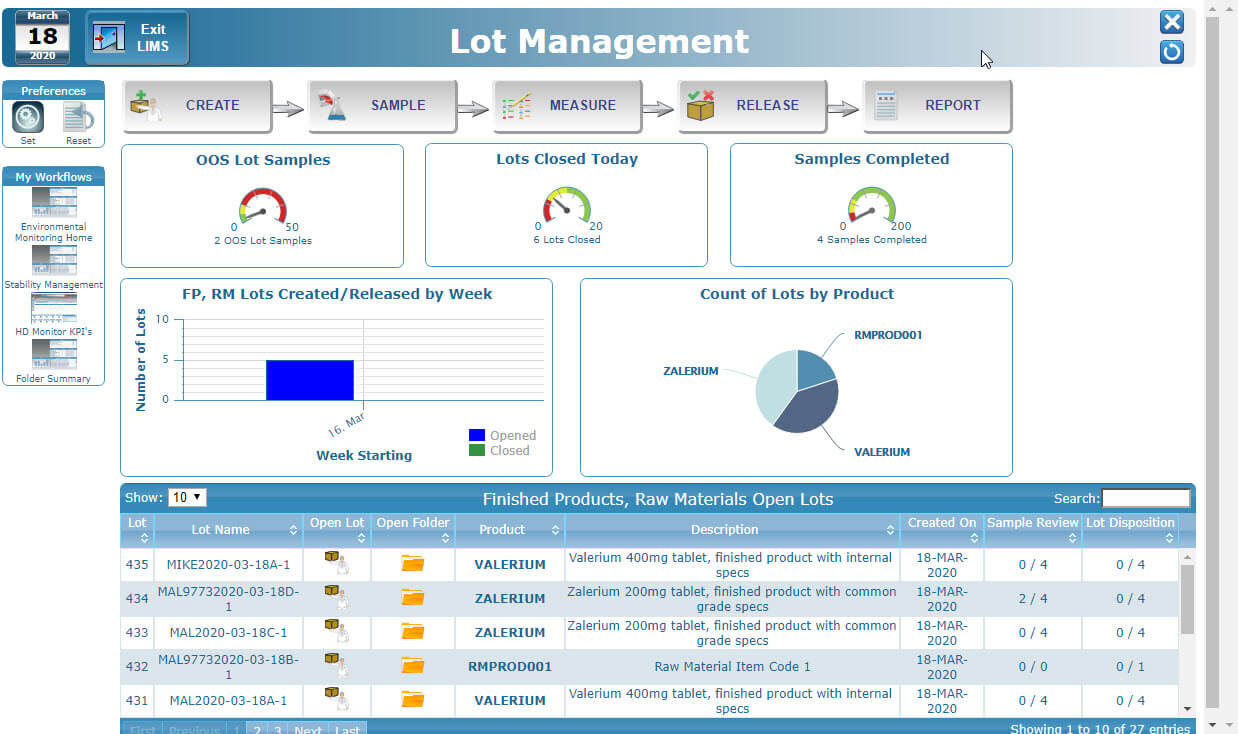
Lot Management Dashboard
The lot management dashboard is an essential tool for laboratories that process large quantities of products. This powerful feature provides crucial information about the lots being processed, ensuring better control over product quality and reducing potential risks associated with lot handling. By leveraging LabWare's Laboratory Information Management System (LIMS), lab managers can easily create new measures based on almost any criteria, making it easier to track and manage their inventory.
Efficient Tracking of Product Lots
In today's fast-paced laboratory environment, keeping track of multiple product lots can be a daunting task. The lot management dashboard simplifies this process by providing real-time data on all aspects related to your lab's inventory. Some key features include:
- Lot tracking: Monitor the status of each individual lot as it moves through various stages in your laboratory workflow.
- Data visualization: Visualize important metrics such as quantity received, quantity released, expiration dates, and more using interactive charts and graphs.
- Filtration options: Filter data based on specific criteria like date range or product type to focus only on relevant information for decision-making purposes.
- Audit trail functionality: Maintain a complete record of changes made to each lot throughout its lifecycle within the system for regulatory compliance requirements.
This comprehensive view allows you to identify trends or issues quickly so that corrective actions can be taken promptly when needed - ultimately improving overall efficiency within your organization while maintaining high-quality standards across all processes involved in managing lots at scale.
Reducing Risks Through Improved Control Measures
Poorly managed lots can lead to a variety of risks, including product recalls, regulatory non-compliance, and financial losses. The lot management dashboard helps mitigate these risks by providing lab managers with the tools they need to implement effective control measures. Some examples include:
- Automated alerts: Set up custom notifications for critical events such as approaching expiration dates or low inventory levels so that appropriate actions can be taken in a timely manner.
- Trend analysis: Analyze historical data to identify patterns or anomalies that may indicate potential issues with specific lots or products before they escalate into more significant problems.
- Quality control integration: Link your lot management system directly with quality control (QC) processes like sample testing and results reporting for seamless tracking of each lot's compliance status throughout its lifecycle within the laboratory environment.
The capacity to address potential difficulties associated with handling considerable amounts of products is imperative for keeping operational effectiveness and guaranteeing long haul achievement in the present serious market. By implementing LabWare's powerful lot management dashboard, you'll have access to all the information needed at your fingertips - empowering you to make informed decisions about how best to manage your organization's valuable resources while minimizing risk exposure along the way.
Achieving Operational Excellence Through Lot Management Dashboard
In conclusion, leveraging LabWare's advanced LIMS capabilities through their comprehensive lot management dashboard allows laboratories across various industries - from pharmaceuticals and biotechnology companies to food manufacturers - to effectively track and manage their inventory while reducing associated risks involved in handling large quantities of products on an ongoing basis. With features like real-time data visualization, automated alerts, trend analysis capabilities alongside robust audit trail functionality built right into this user-friendly platform - it has never been easier for lab managers everywhere to achieve operational excellence when it comes to managing their organization's lots at scale.
Don't let your laboratory fall behind in today's fast-paced, competitive environment. Invest in the right tools like LabWare's lot management dashboard and take control of your inventory management processes - ensuring a more efficient, compliant, and successful operation for years to come. To learn more about how LabWare can help optimize your lab operations, visit their LIMS product page.
Lot Management Dashboard ensures efficient tracking of product lots and reduces risks through improved control measures. With the Stability Management Dashboard, you can monitor active stability studies effectively and make data-driven decisions for optimal results.
Key Takeaway: LabWare's lot management dashboard is a powerful tool for laboratories that process large quantities of products. It provides real-time data on all aspects related to inventory, simplifies tracking of multiple product lots, and helps mitigate risks by implementing effective control measures such as automated alerts and trend analysis. By leveraging LabWare's advanced LIMS capabilities through their comprehensive lot management dashboard, lab managers can achieve operational excellence in managing their organization's valuable resources while minimizing risk exposure along the way.
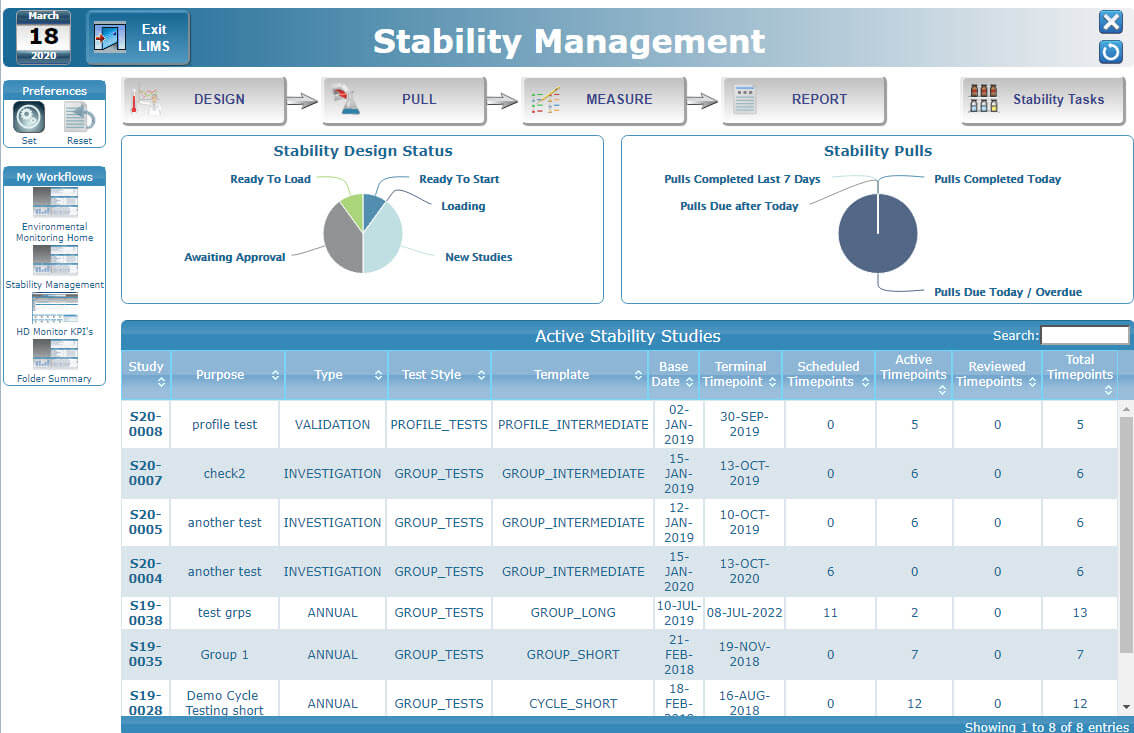
Stability Management Dashboard
The LabWare stability management dashboard is a powerful tool that enables laboratory professionals to closely monitor the status of active stability studies conducted within their facilities. This feature-rich platform can be tailored according to user needs, allowing them to make informed decisions regarding study outcomes and ensure optimal results. In this section, we will discuss how the stability management dashboard helps in effectively monitoring ongoing studies and making data-driven decisions for improved performance.
Monitoring Active Stability Studies Effectively
In any laboratory setting, it is crucial to keep track of ongoing stability studies as they play a significant role in determining product shelf life, storage conditions, and overall quality. The LabWare stability management dashboard provides an efficient way for lab managers and analysts to stay updated on all aspects of these critical tests. With its customizable interface, users can quickly access essential information such as sample details, test schedules, protocols followed during testing procedures, or even real-time updates on study progress.
- Data Visualization: The dashboard offers various visualization options like charts and graphs that help users easily comprehend complex data sets related to their ongoing stability studies.
- User-defined Metrics: Users have the flexibility to define specific metrics relevant to their laboratories' unique requirements while monitoring active studies through the LabWare system.
- Status Tracking: Keep track of your samples' current statuses throughout each stage of testing with clear indicators available on the dashboard itself.
- Email Notifications: Receive timely email notifications whenever there are significant changes or updates made within your active projects - ensuring you never miss out on important developments affecting your work processes.
Making Data-driven Decisions for Optimal Results
By leveraging the insights gained from LabWare's stability management dashboard, laboratory professionals can make well-informed decisions that lead to better outcomes in their ongoing studies. This not only helps improve overall efficiency but also contributes to maintaining high-quality standards across all operations within a lab environment.
- Identifying Trends: The dashboard enables users to spot trends and patterns emerging from their data sets, which can be invaluable when making strategic decisions related to study design or execution.
- Predictive Analysis: By analyzing historical data available on the platform, laboratories can predict potential issues or challenges they may encounter during future stability tests - allowing them to take proactive measures accordingly.
- Risk Mitigation: With real-time access to critical information regarding active studies, labs can quickly identify and address any risks associated with sample handling or testing procedures before they escalate into more significant problems affecting product quality or safety.
- Data Integration: LabWare's stability management dashboard seamlessly integrates with other modules of the Laboratory Information Management System (LIMS), such as lot management and inventory control - ensuring a holistic approach towards managing your laboratory processes effectively.
In today's fast-paced world where time is of utmost importance, having an efficient tool like LabWare's stability management dashboard at your disposal is crucial for achieving success in any laboratory setting. Its customizable features allow you to monitor ongoing studies closely while offering valuable insights that enable informed decision-making throughout each stage of testing. As a result, you gain improved control over various aspects of your work processes - leading ultimately towards enhanced productivity levels and higher customer satisfaction rates within your organization.
Key Takeaway: LabWare's stability management dashboard is a customizable and feature-rich platform that enables laboratory professionals to monitor ongoing studies effectively, make data-driven decisions, and maintain high-quality standards. With various visualization options, user-defined metrics, status tracking, email notifications, identifying trends and patterns emerging from their data sets as well as predictive analysis for risk mitigation are possible.
Conclusion
In conclusion, LIMS KPI Dashboards are crucial for enhancing accountability in labs and customizing KPIs to meet specific lab requirements. LabWare Dashboards streamline data collection and processing while tailoring dashboard features according to user needs. The Lot Management Dashboard efficiently tracks product lots, reducing risks through improved control measures. Meanwhile, the Stability Management Dashboard monitors active stability studies effectively and enables data-driven decisions for optimal results.
Implementing LIMS KPI Dashboards can greatly benefit your laboratory operations by improving efficiency, reducing errors, and ensuring compliance with industry standards. To learn more about how LabWare can help you achieve these benefits through their LIMS solutions, visit their website.

